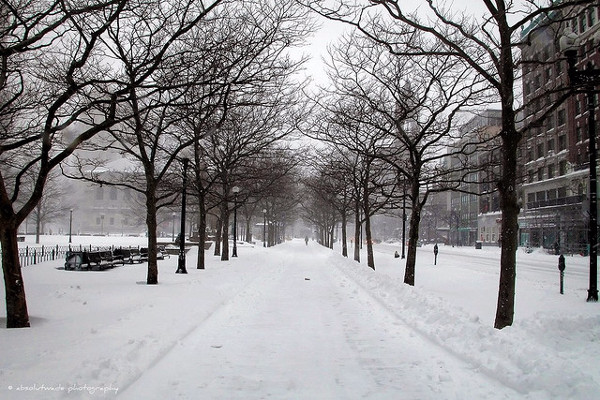Snow Clearing Ordinances
| . Posted in policy - 6 Comments
As landlords we must clear the snow from our properties. If we have an agreement with a tenant that calls for the tenant to remove the snow, that's fine. But if the tenant fails to comply, you as the landlord are on the hook for the city's impending fines.

Boston, 2006. Image CC-BY by Beau Wade.
Here are some representative ordinances, with Worcester (which sometimes ranks among the snowiest cities in the country) representing the most stringent.
Worcester
- Remove snow within 10 hrs of the end of the storm.
- Paths must be at least four (4) feet wide for wheelchairs.
- Fines are $75/day.
- Read the ordinance.
Shrewsbury (near Worcester)
- No ordinances governing removal (confirmed by Highway Dept), except:
- Do not shovel snow into the street.
- No throwing snowballs across the street (true fact, this is unlawful!)
- Read Shrewsbury snow removal.
Springfield
- Landlord or tenant must clear sidewalks within 24 hours.
- Cannot shovel into street.
- Read the code
Boston
- Must clear sidewalks within three hours of snow fall.
- Paths must be 42 inches wide.
- Snow can't be shoveled into the street.
- Fines vary from $50 to $200 per day.
- Read the regulations (search for "chapter xvi" and then scroll down to "16-12.16")
Cambridge
- Must clear sidewalks within 12 hours of snow fall, or within 6 hours of icing.
- Must clear ALL snow. (Really? To where? Thanks, Cambridge.)
- Fines are a flat $50 per day.
- Read the regulations (search for "snow" or browse to 12.16.110)
Somerville
- Must clear sidewalks within six daylight hours after snowfall has stopped
- Must clear sidewalks to 36" wide
- Fines are $100 to $300 per day
- Read the regulations (click on or scroll down to "Shoveling rules for property owners")
Pittsfield
- Must clear abutting sidewalks within 24 hours after snow has stopped.
- Must not throw snow onto the street.
- Read the Pittsfield snow-related information
Fitchburg
- Sidewalks must be cleared by 6 p.m. on the day after snow has stopped.
- Owners must also remove ice from sidewalks; if it cannot be removed they must sprinkle sand or salt (or other suitable substance) on any ice on sidewalks until it can be removed.
- Read the Fitchburg snow removal rules
Greenfield
- Property owners must remove snow from sidewalks abutting property within 24 hours after snowfall has stopped.
- Must also remove ice from sidewalks or sprinkle with sand, salt or another suitable substance.
- Fines for failure to comply range from $10 to $100.
- Read the Greenfield rules for snow removal
Plymouth
- Property owners are responsible for removing snow and ice from public sidewalks adjacent to their property within 48 hours after a snow event.
- It is unlawful to blow or shovel snow into the street.
- Read the Plymouth snow removal page
If you live in another community, odds are good that the rules are basically the same as Worcester's. You probably must clear your sidewalks in timely fashion.
Please note: "42 inches wide" is wheelchair navigation width and can be enforced by the state on behalf of a disabled person even if your municipality does not specify so much width.
Note: if a city plow fills in what you cleared, you may still be on the hook to re-clear it. File a complaint with the city but do not leave it impassable. We know at least one landlord who accumulated a heap of fines to go with his snow pile. He should have photographed it, cleared it, and then complained to the city.




